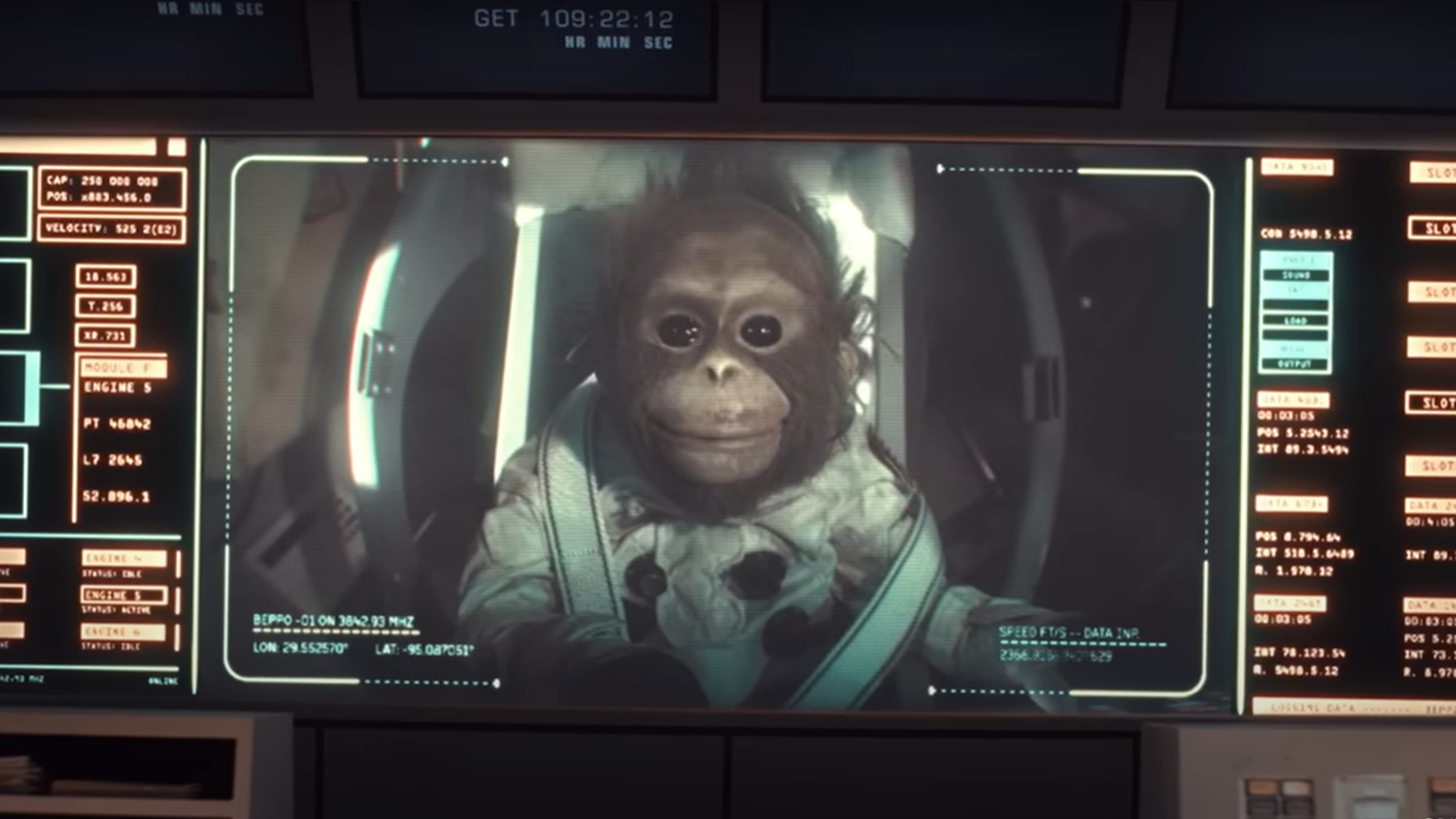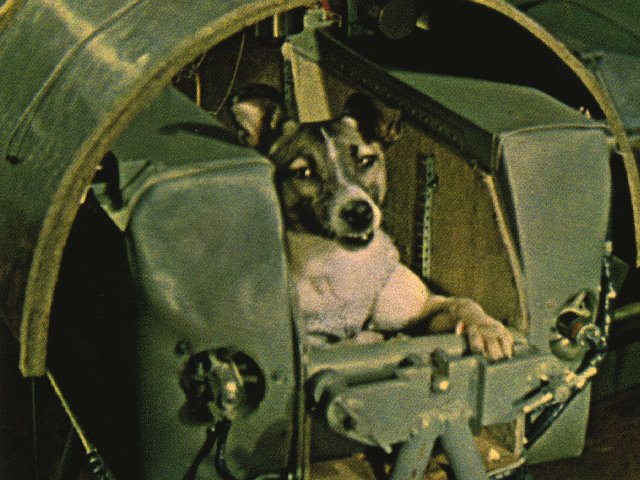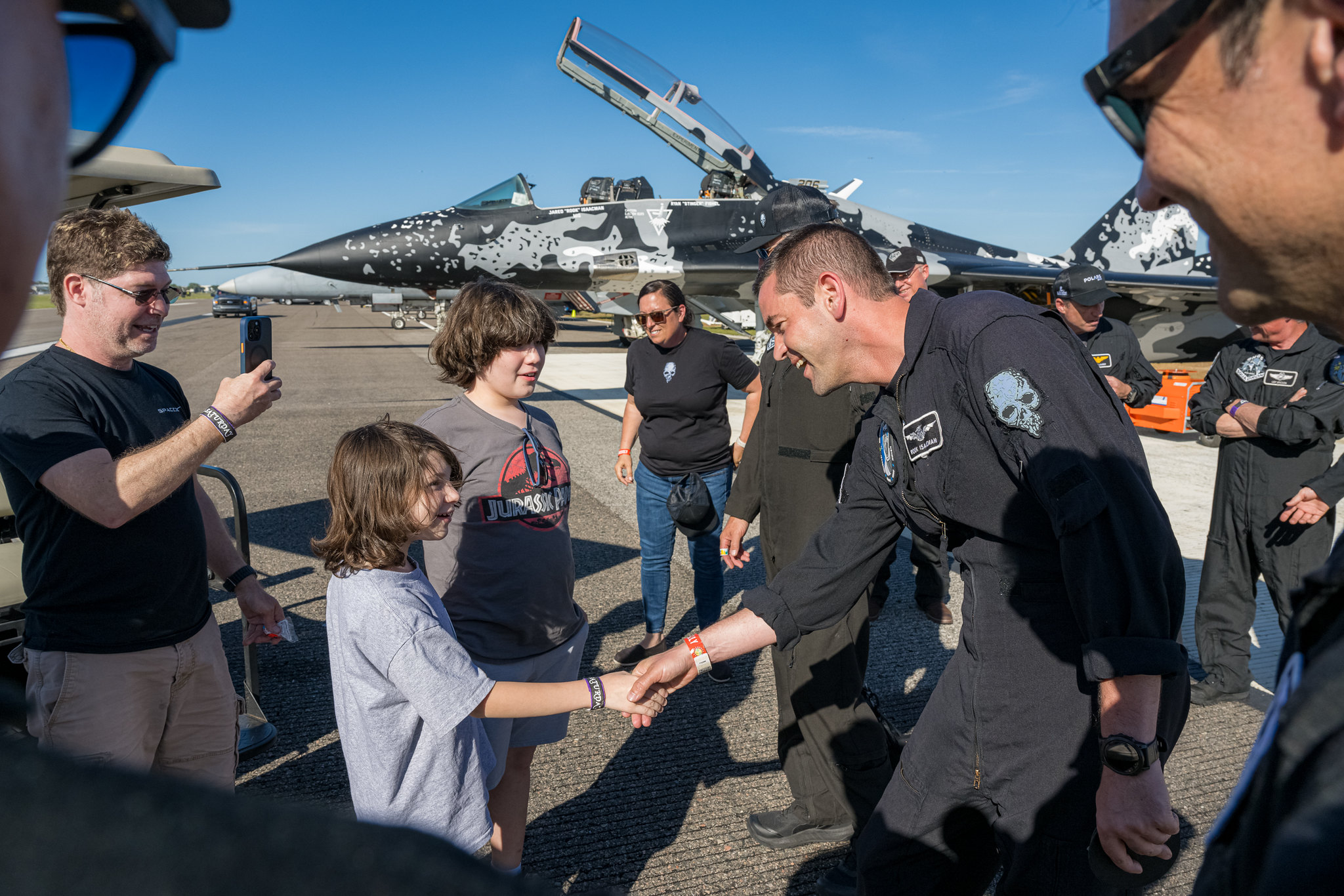'Beppo go home?' An astronaut monkey steals hearts in tear-jerking SNL skit
"Beppo make Earth proud?"

Saturday Night Live is, first and foremost, supposed to be a funny TV show — but it was difficult to laugh at most of its recent sketch, "Beppo," about an astronaut monkey who learns he might not be able to return to the planet. As his giant, yearning eyes begin to tear up, Beppo presses buttons on his communications soundboard to ask mission control's John Mulaney: "Beppo … go … home?" Pained, Mulaney wonders how to explain death to Beppo.
Sweet Beppo forces us to remember the naive animals who have indeed been sent to space — especially the beings who went there believing they'd come home safely, but did not. When asked for his last words, Beppo presses a button that delivers a simple message: "help." Would Laika the space dog have had any last words? What about Gordo the squirrel monkey? Laska the mouse? Would they have been the same as Beppo's?
"Use Beppo's words," mission operator James Austin Johnson suggests to Mulaney, who takes a deep breath. "Beppo no go home. Beppo go dark. Beppo equals zero forever," Mulaney says to Beppo. Beppo replies: "Beppo scared."
Laika's tragedy
It was the year 1957 when 3-year-old Laika, a stray husky mix who lived in Moscow, went to space on the Soviet spacecraft Sputnik 2. She was chosen for the mission because scientists thought her life on the streets of Russia would mean she's relatively well-equipped to deal with the harsh environment of space. Yet, having been sent up with only one meal and a seven-day oxygen supply, Laika was never meant to survive.
As the story goes, the Russian physician Vladimir Yazdovsky, who was one of Laika's keepers, took her home to play with his kids shortly before the flight. He once recalled, "I wanted to do something nice for the dog." Cathleen Lewis, the curator of international space programs and spacesuits at the Smithsonian's National Air and Space Museum, has also said there were reports of a female physician who broke protocol by feeding Laika before her trip.
The way Laika died isn't exactly clear, as the Soviet Union originally said she would have either been poisoned by food she was given to eat in space or have been asphyxiated due to a lack of oxygen. However, scientists involved with the Russian space program reported in 1999 that Laika would have died during her fourth orbit of the Earth after a failure in Sputnik 2's temperature controls. Nonetheless, Laika was never going to make it home, even if she survived above Earth — in 1958, after approximately 2,570 orbits, Laika's spacecraft disintegrated in our planet's atmosphere. She is remembered as a hero.
"The more time passes, the more I'm sorry about it," one of the scientists assigned to Laika's program is reported to have said after the tragedy. "We shouldn't have done it. We did not learn enough from the mission to justify the death of the dog."
Get the Space.com Newsletter
Breaking space news, the latest updates on rocket launches, skywatching events and more!

"Beppo know this wrong"
"Beppo's words," as Johnson says in the SNL sketch, are pre-programmed prompts connected to buttons in the monkey's spacecraft. They are, of course, limited to mission-specific things like "Beppo," "Earth" and "home," as well as what I can only imagine are his hobbies. He once tries to make a chess move, saying "knight e6," which is unfortunately an illegal move in the match they had going, Mulaney points out. This match implies that, before this moment, mission operators would hang out with Beppo and keep him company. Beppo would have wanted to come home to enjoy the things he loves; he could've practiced his middle game with the friends he made at work.
"Beppo know this wrong," Beppo uses his prompts to say at one point, after being told it isn't a possibility to fly home like a bird. "But Beppo jump home?" Of course, as suspected, the answer is no.
It is poignant to realize that some scientists, like Yazdovsky, tried to use "Laika's words," too. With their hearts, they attempted to show her that she's loved. This is something we can never be sure Laika experienced very often, given her lonely life on the streets of Moscow. It is a beautiful thing that we can love animals so deeply without them ever uttering a word to us.
Before Beppo is saved by Ego Nwodim at mission control who has Hidden-Figures-esque intelligence — a choice I suspect the writers had to make in order to save us from our despair — he asks perhaps the most tear-jerking question of all: "Beppo make Earth proud?"
There's a monument dedicated to Laika near a Moscow military facility; one reviewer on TripAdviser says they traveled from Brazil just to see it. Another review, translated from Russian, says "The husky in full armor is depicted with such dynamism that it takes your breath away. Well, this is how you can thank the animals that gave their lives for the development of people."
Still another, also translated from Russian, says "Every day I walk past Laika. She sits poor behind the fence, you can't even notice her right away. She recognizes me and wags her tail, and points her nose at the sky. Don't forget, she says."
I suppose I should tell you now what eventually happened to Beppo. After returning to mission control miraculously, he makes out with Mulaney's character's wife (Mulaney is cool with it). If only all spacefaring animals could be as lucky as Beppo.
Join our Space Forums to keep talking space on the latest missions, night sky and more! And if you have a news tip, correction or comment, let us know at: community@space.com.

Monisha Ravisetti is Space.com's Astronomy Editor. She covers black holes, star explosions, gravitational waves, exoplanet discoveries and other enigmas hidden across the fabric of space and time. Previously, she was a science writer at CNET, and before that, reported for The Academic Times. Prior to becoming a writer, she was an immunology researcher at Weill Cornell Medical Center in New York. She graduated from New York University in 2018 with a B.A. in philosophy, physics and chemistry. She spends too much time playing online chess. Her favorite planet is Earth.
-
Unclear Engineer And in the real world: https://www.nbcnews.com/news/us-news/monkeys-escape-alpha-genesis-research-facility-south-carolina-rcna179077 .Reply
We use a lot of animals for scientific and commercial research, especially in the pharmaceutical industry.

